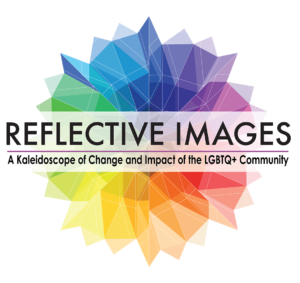Reflective Images
This project was funded by the Arkansas Community Foundation, supported through grants from the Alice L. Walton Foundation, Olivia and Tom Walton through the Walton Family Foundation, as well additional funds from the Winthrop Rockefeller Foundation.
All vignettes
“My heart knows who I am and who I’ll turn out to be.”
-Invisible Life by E. Lynn Harris
E. Lynn Harris spent much of his life being a trailblazer. As a college student he served as the University of Arkansas’s first Black male cheerleader. As an openly gay Black author, he traversed the intricate themes of race and sexuality while serving as a role model and activist for authors who came after him. Harris is an important figure in the history of LGBTQ+ history and as an Arkansan illustrates another vital figure in Arkansas’s contribution to national LGBTQ+ culture.
To fully comprehend Harris’s contribution to LGBTQ+ history, some historical context is necessary. Throughout the 1980s, the national LGBTQ+ movement was viewed as a predominantly white cisgender male movement. There are many reasons for this including the movement’s failure to acknowledge the contributions of Black transgender activists and the divergent obstacles non-white Queer individuals experienced. Historian Kevin Mumford wrote of these divergent experiences and thus divergent historical narratives in Not Straight, Not White Black Gay Men from the March on Washington to the AIDS Crisis. Mumford argues that the experiences of Black queer men are so different from those of their white counterparts that the fight for LGBTQ+ rights for Black men and women has to be acknowledged as a completely separate narrative.
The intersection of race and sexuality was always contentious. Common themes of respectability and masculinity take on different historical contexts and meaning when race is added. Civil rights leaders often used respectability and morality to combat racist stereotypes about Black families. Bayard Rustin, a close confidant of Martin Luther King, Jr. and major organizer of the 1963 March on Washington, saw his influence and recognition diminished because he was openly gay. Finally, the role of the church and importance of Christianity in the civil rights movement made it more difficult for some Black men to be openly gay for fear of losing family or losing their place in the movement. Activist James Baldwin’s writings speak to a lot of these themes.
It is out of this difficult and contentious landscape that E. Lynn Harris came to the national scene in 1991 with the release of Invisible Life. His debut work did not shy away from engaging with these issues of race, sexuality, and identity as he wrote characters who struggled with coming out and being “on the down low” in their families and communities for fear of ostracism. His subsequent novels followed similar themes. In an interview with the Los Angeles Times in 1996, Harris said: “I wanted to try to convey the pain and loneliness involved with being black and being gay.” In his third novel And this Too Shall Pass the protagonist is an athlete coming to terms with his identity. This combated many stereotypes about masculinity and sexual orientation. Because his works were popular fiction, they were accessible to millions of readers across the country who were reading about the Black LGBTQ+ experience for the first time. “He gave readers an expanded view of Black life,” Paula L. Woods, contributor to the Los Angeles Times Book Review stated in 2009. His works also encouraged Black communities around the country to acknowledge the existence of gay men in their churches and communities. It sparked important conversations that continue through the present.
It is important to note that even Harris himself battled these issues of race, identity, and fear of coming out. He did not publicly come out as gay until after he made it to the national stage as a best-selling author. “I thought maybe if others saw how the public accepted me, that it might give them some courage.”
Harris deserves acknowledgement as a significant figure in LGBTQ+ history. As Black communities grappled with how sexuality altered the long Black freedom movement, Harris’s encompassed these struggles while creating a more inclusive space for Black gay men to recognize themselves in the pages of his works. He helped others listen to the their hearts and turn out who they were meant to be.
Sources
McClellan, Dennis. “E. Lynn Harris Dies at 54.” Los Angeles Times, July 25, 2009. Accessible from: https://www.latimes.com/local/obituaries/la-me-e-lynn-harris25-2009jul25-story.html
Mumford, Kevin. Not Straight, Not White: Black Gay Men from March on Washington to the AIDS Crisis, University of North Carolina Press, 2016.


